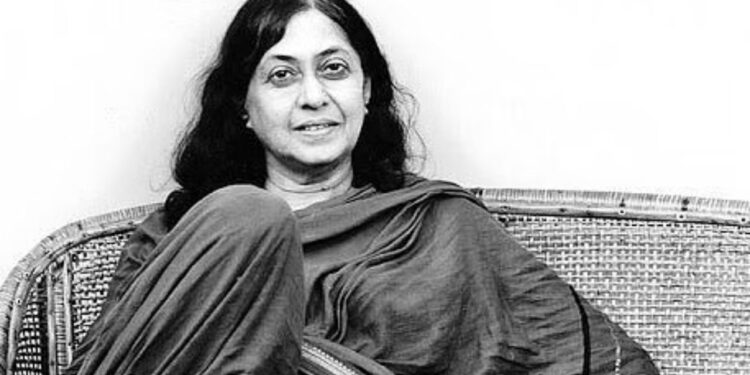ADVERTISEMENT
Discuss the style and themes of the poems of Kamala Das with special reference to the poems
Discuss the style and themes of the poems of Kamala Das with special reference to the poems-Famous for her brave and unrestrained poetry that explores the nuances of identity, the difficulties faced by women in a patriarchal society, and the complexities of human relationships, Kamala Das is a legendary figure in Indian literature.
ADVERTISEMENT
ADVERTISEMENT
Style of Kamala Das:
- Confessional Poetry: Kamala Das is frequently linked to confessional poetry, a literary genre in which the poet shares their feelings and experiences in a close-knit manner. Her poems provide readers a very intimate and reflective journey by acting as a canvas for her deepest desires, thoughts, and struggles. In pieces such as “An Introduction,” Das fearlessly challenges conventional norms and expectations, showcasing her unabashed identity.
- Free Verse and Conversational Tone: Das uses free verse extensively, which enables her to stray from conventional poetic forms. Her poems frequently have a conversational tone that draws the reader in right away and reads like an honest discussion. In “My Grandmother’s House,” she revisits her past in a nostalgic yet assertive manner, demonstrating this style.
- Sensuous Imagery: Das’s poems are known for their sensual and moving imagery. She creates a tangible atmosphere in her poetry by using sensory-rich, vivid descriptions that captivate the reader. She uses sensual imagery, for instance, in “The Sunshine Cat,” to examine the complexities of physical intimacy and desire.
- Symbolism and Metaphor: Kamala Das often relies on symbolism and metaphor to convey profound meanings within her poems. The use of symbols adds layers of interpretation to her work, allowing readers to engage with multiple levels of meaning. In “The Dance of the Eunuchs,” she employs the metaphor of the eunuch dance to explore themes of gender identity and societal expectations.
Also Read-
- Analyze the novel The Binding Vine and discuss the techniques followed by Shashi Deshpande in it
- Discuss the brief history of short story writing in English in India
- Examine the themes of Horace’s satires
Themes in Kamala Das’s Poetry:
- Female Identity and Empowerment: The study of female empowerment and identity is a major theme in Kamala Das’s poetry. In “An Introduction,” she challenges traditional roles and asserts her right to individuality as she battles the social constructs that are imposed upon women. The poem is a potent statement of feminist consciousness that promotes women’s freedom from social conventions.
- Love and Desire: Das frequently explores the theme of love in his poetry, both emotional and physical. Her investigation of desire is characterized by candor and a rejection of social norms. “The Sunshine Cat” explores the complexities of intimate relationships, expressing the intensity of desire and the fleeting nature of love through metaphorical language.
- Nostalgia and Cultural Identity: Kamala Das often reflects on her cultural roots and the changing dynamics of society in her poetry. In “My Grandmother’s House,” she nostalgically revisits her ancestral home, invoking a sense of loss and a longing for a bygone era. The poem becomes a poignant exploration of cultural identity in the face of modernity.
- Critique of Patriarchy: Das’s poetry is marked by a fierce critique of patriarchal norms and the restrictive roles assigned to women. In “The Dance of the Eunuchs,” she employs the image of eunuchs engaging in a dance as a powerful metaphor for breaking free from societal expectations. The poem challenges conventional gender roles and advocates for a more inclusive and accepting society.
- Existential Angst: Existential themes pervade some of Das’s poems, reflecting a deep sense of existential angst and a quest for meaning. In “Forest Fire,” she contemplates the transience of life, using the metaphor of a forest fire to explore the inevitability of change and the fleeting nature of human existence.
Selected Poems:
- “An Introduction”: This poem serves as a manifesto for Kamala Das’s literary and personal identity. In it, she boldly rejects the labels imposed on her by society and declares her autonomy. The poem reflects her feminist stance, challenging the norms that confine women and proclaiming her right to self-expression.
- “My Grandmother’s House”: Nostalgia and cultural identity take center stage in this poem as Das reflects on the home of her grandmother. Through vivid imagery and emotional recollections, she captures the essence of her ancestral roots and laments the erosion of traditional values in the face of modernity.
- “The Sunshine Cat”: In this poem, Das explores the themes of love and desire with intense sensuality. The poem employs metaphorical language to convey the transient nature of love and the complexity of physical intimacy. It is a testament to Das’s unapologetic approach to the exploration of desire.
- “The Dance of the Eunuchs”: Using the metaphor of the dance of eunuchs, Das critiques patriarchal norms and the limitations imposed on individuals based on gender. The poem calls for a breaking away from societal expectations and celebrates the possibility of liberation from oppressive structures.
- “Forest Fire”: Existential contemplation characterizes this poem, where Das reflects on the impermanence of life. The metaphor of a forest fire serves as a poignant analogy for the inevitability of change and the fleeting nature of human existence. The poem captures a sense of existential angst and a search for meaning in the face of mortality.













